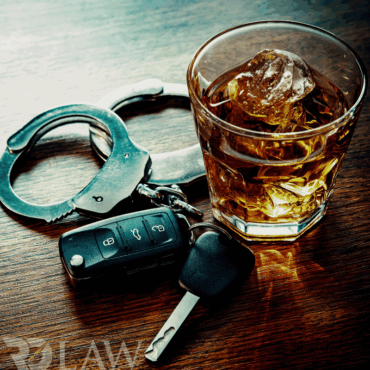DWI Defense Attorney in Minnesota

Steering Through Serious DWI Charges with Confidence and Strategy
Being charged with DWI in Minnesota can derail your life quickly—from the moment you’re pulled over, the legal system starts moving against you.
At Rob Doar Law, we provide aggressive, strategic defense to challenge DWI charges head-on. With training in law enforcement procedures and deep knowledge of how these cases unfold in Minnesota courts, we know how to spot the mistakes officers make—and how to turn those into powerful tools for your defense.>
Understanding Minnesota DWI and DUI Charges
Minnesota law criminalizes driving while impaired by alcohol, drugs, or a combination of both. DWI offenses are charged under:
- Minn. Stat. § 169A.20 – Driving While Impaired
Common types of DWI charges include:
First-Time DWI (Fourth-Degree):
Typically a misdemeanor for a BAC under 0.16 with no aggravating factors.
Second or Third DWI (Third or Second-Degree):
Gross misdemeanors if prior offenses or test refusals exist within 10 years.
Test Refusal:
Refusing a breath, blood, or urine test is a separate criminal offense. (Minn. Stat. § 169A.20, subd. 2)
Felony DWI (First-Degree DWI):
Four or more prior offenses or a prior felony DWI; punishable by up to 7 years in prison.
Underage DWI:
Any detectable alcohol in drivers under 21. (Minn. Stat. § 169A.33)
Enhancements:
Prior DWI conviction within 10 years, prior alcohol-related license revocation within 10 years, blood alcohol concentration of 0.16 or higher, refusal to submit to chemical testing, child under 16 in the vehicle (when driver is 3+ years older), three or more prior DWI-related incidents, prior felony DWI or criminal vehicular homicide conviction.
We understand that every DWI case starts with a stop… and that’s where our defense begins.
- Unlawful Traffic Stop: Investigating whether the officer had reasonable, articulable suspicion to initiate the stop under Minnesota law.
- Field Sobriety Testing: Challenging the administration, reliability, and interpretation of roadside tests often conducted under subjective conditions.
- Chemical Testing: Examining breath or blood testing procedures for improper calibration, protocol errors, or mishandled samples.
- Probable Cause and Arrest: Assessing whether the arrest was supported by legally sufficient evidence or if constitutional violations occurred.
With firsthand knowledge of law enforcement training and practices, we recognize where officers often cut corners—and we use that insight to your advantage.
Navigating the Legal Process
we handle what matters most: keeping you out of jail and minimizing the long-term damage of a DWI conviction
Here’s what you can expect:
Initial Consultation: Discuss your case details and concerns.
Case Evaluation: Analyze evidence and identify defense strategies.
Pre-Trial Proceedings: Attend hearings and negotiate with prosecutors.
Trial: Present your defense before a judge or jury, if necessary.
Post-Trial: Address sentencing or explore appeal options, depending on the outcome.
Throughout this process, Rob Doar Law serves as your anchor, providing steadfast support and guidance.
Contact Rob Doar Law Today
Let’s talk strategy.
Frequently Asked Questions
Remain calm, keep your hands visible, roll down your window down only enough to provide your license and insurance and engage in minimal conversation with the officer. You are not required to perform field sobriety tests or answer questions about drinking—politely decline and ask to speak with a lawyer before saying more.
No—you are not legally required to perform field sobriety tests (SFSTs) or take a preliminary breath test (PBT) during a roadside stop in Minnesota. These tests are voluntary, and refusing them cannot result in a separate criminal charge (unlike refusal of an official post-arrest test). Politely declining these tests may prevent officers from collecting additional evidence to justify an arrest.
Refusing a test after arrest is a separate crime under Minn. Stat. § 169A.20, subd. 2. While you have the right to consult an attorney before deciding, refusal can lead to enhanced penalties, including longer license revocation and possible jail time.
A first offense is usually a misdemeanor, punishable by up to 90 days in jail and a $1,000 fine, and/or possible probation, treatment, and ignition interlock requirements. Aggravating factors like high BAC or passengers under 16 can increase charges. Hiring an attorney can greatly reduce the level of penalty you receive.
DWIs stay on your record for 10 years and count toward enhancing future offenses. Even a first offense can follow you for a decade, making early defense critical.
Yes. Many DWI charges can be reduced or dismissed by challenging the stop, arrest, testing procedure, or by exposing inconsistencies in officer conduct.
Absolutely. Even if you think pleading guilty is your best option, a lawyer can negotiate a better outcome, protect your rights, and ensure that you're not accepting harsher consequences than necessary.
Minnesota law uses the term DWI (Driving While Impaired) for all alcohol- and drug-related driving offenses. DUI is often used informally, but DWI is the official charge under Minn. Stat. § 169A.20.
The process involves an initial appearance, motion hearings (where you can challenge the stop or test results), pretrial negotiations, and possibly trial.